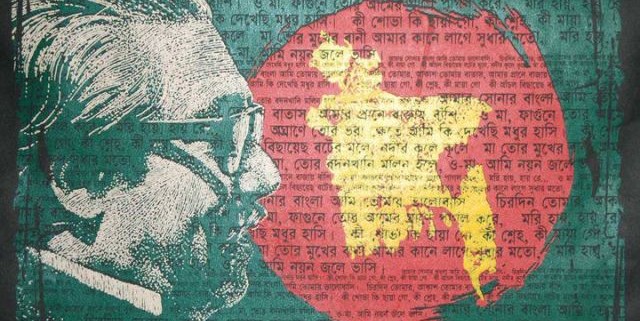Early Life:
Born on March 17, 1920 at Tungipara in Gopalgonj district, Sheikh Mujibur Rahman was the third child of Sheikh Lutfur Rahman and Saira Begum. He studied at the Islamia College and graduated from Dhaka University. At 18, Mujib married Fazilatunnesa. They became happy parents of two daughters and three sons.
Beginning of an Epic Journey:
Mujib joined All India Muslim Students Federation in 1940 and in 1943, switched to Bengal Muslim League where he came close to Huseyn Shaheed Suhrawardy. While at Dhaka University, he founded the East Pakistan Muslim Students’ League.
Language Movement
Mujib led students’ strikes and protests when the language discourse of Pakistan first emerged in 1948 and remained active to organize the movements which culminated on February 21, 1952.
Climbing Steps of Politics
He left Muslim League to join Suhrawardy and Maulana Bhashani to form the Awami Muslim League. He became the first Joint Secretary of the party and then the General Secretary in 1953. In the elections of 1954, Mujib was elected at the East Pakistan Legislative Assembly and became the Agricultural Minister. In 1956, he joined a second coalition government as the Commerce and Industries Minister.
Six Point Demand:
In 1963, Sheikh Mujib became the President of Awami Muslim League after the death of Suhrawardy. He strongly opposed Ayub Khan’s basic democracy. He proclaimed a 6-point demand seeking autonomy of East Pakistan at the national conference of opposition political parties in Lahore in 1966.
Agartala Conspiracy Case
Afraid of public support for Mujib’s 6-point demand, the then Pakistani government arrested him in the Agartala conspiracy case but was forced to release him amidst massive public unrest. On December 5, 1969, he declared that East Pakistan would henceforth be called Bangladesh.
Elections of 1970
In the general elections of Pakistan in 1970, Awami League won a massive majority under Mujib’s Leadership. His party swooped in all but two of East Pakistan’s quota of seats in the National Assembly. The West Pakistani rulers however were completely against Mujib’s demand for greater autonomy.
March 07 Speech
The then Pak President Yahya Khan delayed the national assembly to bar Awami League from forming the provincial government. In a historic speech at the Racecourse Ground in Dhaka on March 7, 1971, Mujib called for the independence of Bangladesh. Yahya Khan declared martial law, banned Awami League and ordered arrest of Sheikh Mujib.
Genocide and Independence of Bangladesh
On the night of March 25, 1971, Pak army launched operation searchlight and started large scale genocide of the innocent Bengalis. Sheikh Mujib was arrested and taken to Pakistan. Before that, Mujib declared the independence of Bangladesh and asked the people to create resistance against the occupying Pak army.
New Country Gets First Govt.
On March 17, 1971, the first government of the People’s Republic of Bangladesh was formed and Mujib was made the President of the country in his absence. Soon after that, Muktibahini, the freedom fighters’ force was formed and it started putting up strong resistance against the Pak army.
Victory at Last
After nine months of bloody war which killed over 3 millions of Bengalis, the Pak army surrendered to the allied forces of Muktibahini and Indian army. A new nation is born- Bangladesh. Sheikh Mujibur Rahman returned home on January 10, 1972 and took the charge of reconstructing the war-torn country.
Reconstruction Begins
Mujib focused on humanitarian and development assistance from the international community to reconstruct the country. In a bid to bring political stability which was prerequisite to its economic improvement, he introduced one-party rule. All political parties came under one umbrella of identity known as BAKSAL.
Assassination:
On the night of August 15, 1975, a group of wayward army officers assassinated Mujib and all of his family members except the two daughters. This brutal assassination not only put an indelible smudge in the newborn nation’s history, but led the country into a political vacuum. Democracy started fading away and the reconstruction process suffered a major setback.




